Ingress 常用配置
Ingress 常用配置(持续更新)
Ingress 配置修改方法
通过 Rancher UI 配置
依次进入 system 项目|配置映射,然后在 ingress-nginx 命名空间部分找到 nginx-configuration配置映射并编辑 nginx-configuration。
然后在 配置映射 中以键值对形式添加参数,比如: server-tokens=false。
注意: 配置映射设置的参数是作用于全局,如果想局部生效,可通过对应的 注释 去配置相应参数,配置方法文章后面会说明。
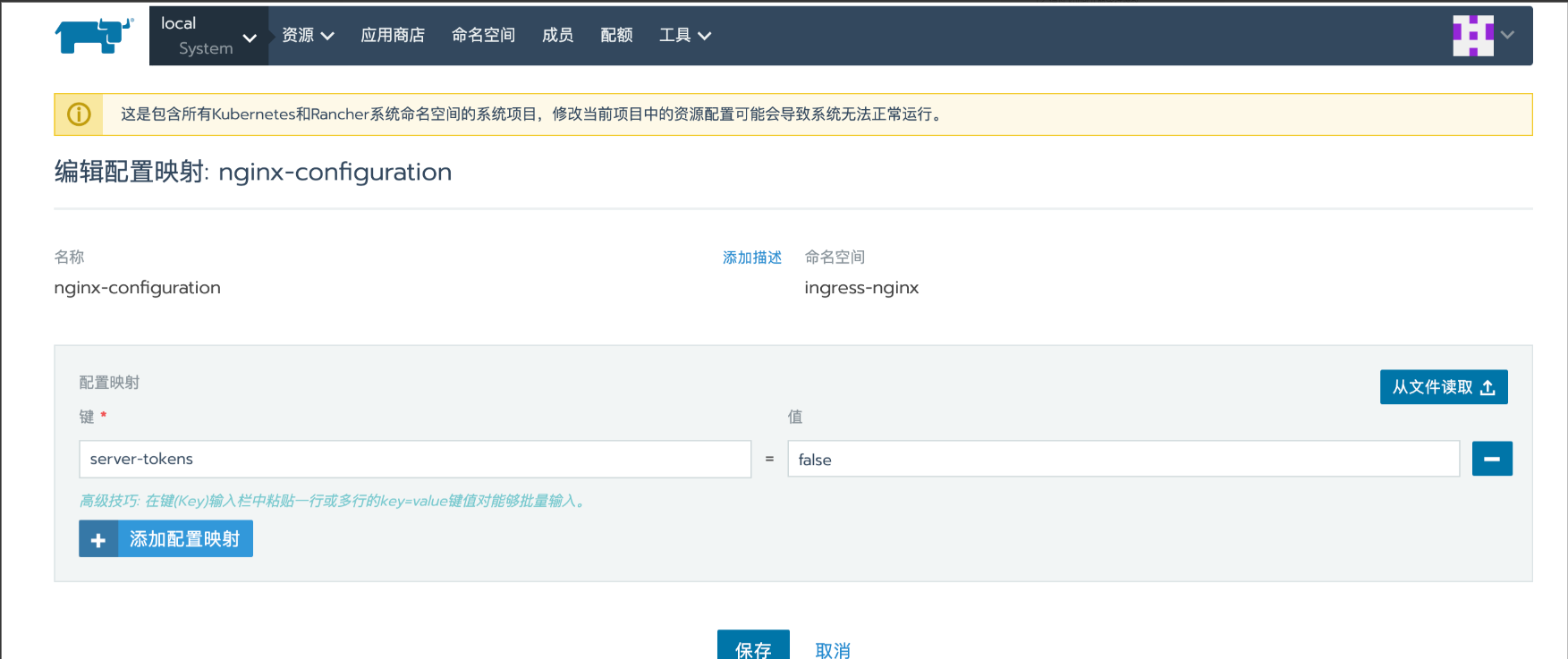
通过 kubectl 命令行修改
执行以下命令进入配置映射文件的编辑模式
kubectl -n ingress-nginx edit configmaps nginx-configuration
然后在 data 字段中添加相应参数,比如: server-tokens: "false",注意双引号。
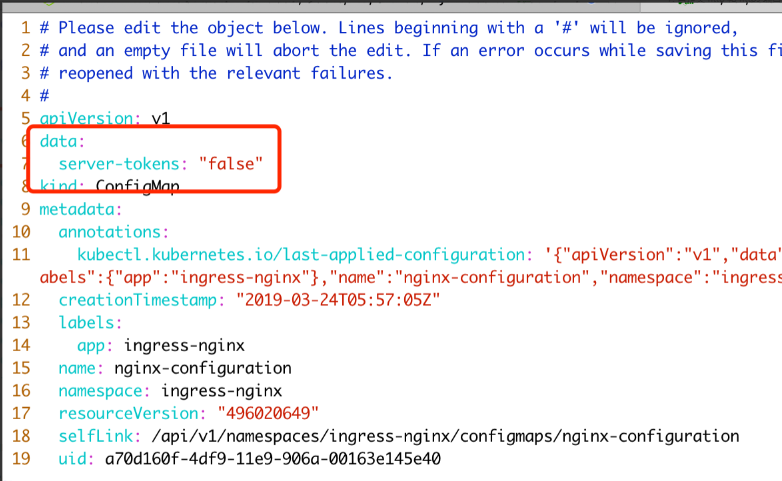
kubectl ingress-nginx plugin
ingress 大概从 0.26.0(或 v0.24.0)版本开始不再支持在 nginx.conf 配置文件中直接显示 backend。
upstream upstream_balancer { ### Attention!!! # # We no longer create "upstream" section for every backend. # Backends are handled dynamically using Lua. If you would like to debug # and see what backends ingress-nginx has in its memory you can # install our kubectl plugin https://kubernetes.github.io/ingress-nginx/kubectl-plugin. # Once you have the plugin you can use "kubectl ingress-nginx backends" command to # inspect current backends. # ### server 0.0.0.1; # placeholder balancer_by_lua_block { balancer.balance() }
backend 数据保存在内存中,将通过 Lua 动态的去生成 Nginx 配置文件。为了 debug ingress 的配置,ingress 推出了一款 kubectl 插件,可以通过此插件查看相应的配置信息。
安装 krew
Krew 可以理解为 kubectl 插件的包管理工具。借助 Krew,可以轻松地使用 kubectl plugin 查询、安装和管理插件,使用类似 apt、dnf 或 brew。
- macOS/Linux
-
需要提前安装 git 工具
-
在终端中运行以下命令以下载并安装 krew
( set -x; cd "$(mktemp -d)" && curl -fsSLO "https://github.com/kubernetes-sigs/krew/releases/latest/download/krew.{tar.gz,yaml}" && tar zxvf krew.tar.gz && KREW=./krew-"$(uname | tr '[:upper:]' '[:lower:]')_amd64" && "$KREW" install --manifest=krew.yaml --archive=krew.tar.gz && "$KREW" update)
-
在
.bashrc或.zshrc文件中添加以下内容将$HOME/.krew/bin目录添加到 PATH 环境变量。 -
运行
kubectl krew验证命令是否运行正常。export PATH="${KREW_ROOT:-$HOME/.krew}/bin:$PATH"
安装 kubectl ingress-nginx plugin
-
运行以下命令安装 kubectl ingress-nginx plugin
kubectl krew install ingress-nginx -
安装完成后,可通过以下命令查看插件安装是否正常
kubectl ingress-nginx --helpA kubectl plugin for inspecting your ingress-nginx deploymentsUsage: ingress-nginx [command]Available Commands: backends Inspect the dynamic backend information of an ingress-nginx instance certs Output the certificate data stored in an ingress-nginx pod conf Inspect the generated nginx.conf exec Execute a command inside an ingress-nginx pod general Inspect the other dynamic ingress-nginx information help Help about any command info Show information about the ingress-nginx service ingresses Provide a short summary of all of the ingress definitions lint Inspect kubernetes resources for possible issues logs Get the kubernetes logs for an ingress-nginx pod ssh ssh into a running ingress-nginx podFlags: --as string Username to impersonate for the operation --as-group stringArray Group to impersonate for the operation, this flag can be repeated to specify multiple groups. --cache-dir string Default HTTP cache directory (default "/Users/hxl/.kube/http-cache") --certificate-authority string Path to a cert file for the certificate authority --client-certificate string Path to a client certificate file for TLS --client-key string Path to a client key file for TLS --cluster string The name of the kubeconfig cluster to use --context string The name of the kubeconfig context to use -h, --help help for ingress-nginx --insecure-skip-tls-verify If true, the server's certificate will not be checked for validity. This will make your HTTPS connections insecure --kubeconfig string Path to the kubeconfig file to use for CLI requests. -n, --namespace string If present, the namespace scope for this CLI request --request-timeout string The length of time to wait before giving up on a single server request. Non-zero values should contain a corresponding time unit (e.g. 1s, 2m, 3h). A value of zero means don't timeout requests. (default "0") -s, --server string The address and port of the Kubernetes API server --tls-server-name string Server name to use for server certificate validation. If it is not provided, the hostname used to contact the server is used --token string Bearer token for authentication to the API server --user string The name of the kubeconfig user to useUse "ingress-nginx [command] --help" for more information about a command.
kubectl ingress-nginx plugin 用法
注意: 因为 rancher 或 rke 创建的集群中,ingress 控制器是以 DaemonSet 的方式运行。kubectl ingress-nginx plugin 查看配置时需要指定资源,默认只支持
--deployment。在 rancher 或 rke 创建的 ingress 默认都有app=ingress-nginx标签,所以这里用标签来指定资源。
-
查看 Nginx 配置
kubectl ingress-nginx --kubeconfig=xxxx -n ingress-nginx -l app=ingress-nginx conf以上的命令将会输出全部规则的配置,可以通过指定域名来输出指定配置的配置。
kubectl ingress-nginx --kubeconfig=xxxx -n ingress-nginx -l app=ingress-nginx conf --host <配置的域名> -
查看 backends
kubectl ingress-nginx --kubeconfig=xxxx -n ingress-nginx -l app=ingress-nginx backends
永久重定向状态码 (http-redirect-code)
ingress 中重定向的状态码默认是 308,某些情况下我们可能需要 301 状态码,可以按照以下方法配置。
全局配置
可通过在配置映射中添加 http-redirect-code=301 来修改全局重定向状态码,修改后所有 ingress 规则的重定向状态码都将是 301。
局部配置
如果只想某个域名使用 301 状态码,那可以编辑对应的 ingress 规则添加以下注释。
nginx.ingress.kubernetes.io/permanent-redirect-code: '301' # 默认 308
代理外部应用(域名(http、https)或 ip + 端口)
创建外部服务
假设有一个外部应用,是通过域名 123.com 进行访问。现在想在 ingress 中通过新的域名 abc.com 去代理这个外部应用。那么需要先把外部域名通过外部服务的方式引入 K8S 集群中,然后 ingress 去调用这个外部服务。
-
在服务发现页面,添加 一条 DNS 记录(或者叫新建一个 SVC)

-
DNS 记录配置详情
-
DNS 记录名称
名称可以随意填写,但是不能以数字开头,不能大写
-
命名空间
DNS 记录所在的命名空间
-
解析类型
选择解析类型,可以选择外部域名或者外部 ip
-
填写目标域名或者目标 ip (这里不用写端口)
-
端口映射
这个参数很重要,需要根据外部服务访问的真实端口来配置。比如你的服务访问是通过
http://123.com:9000来访问的,那么这里就需要填写 9000 端口。如果是通过http://123.com或者https://123.com访问,80 或 443 端口也需要填写。
-
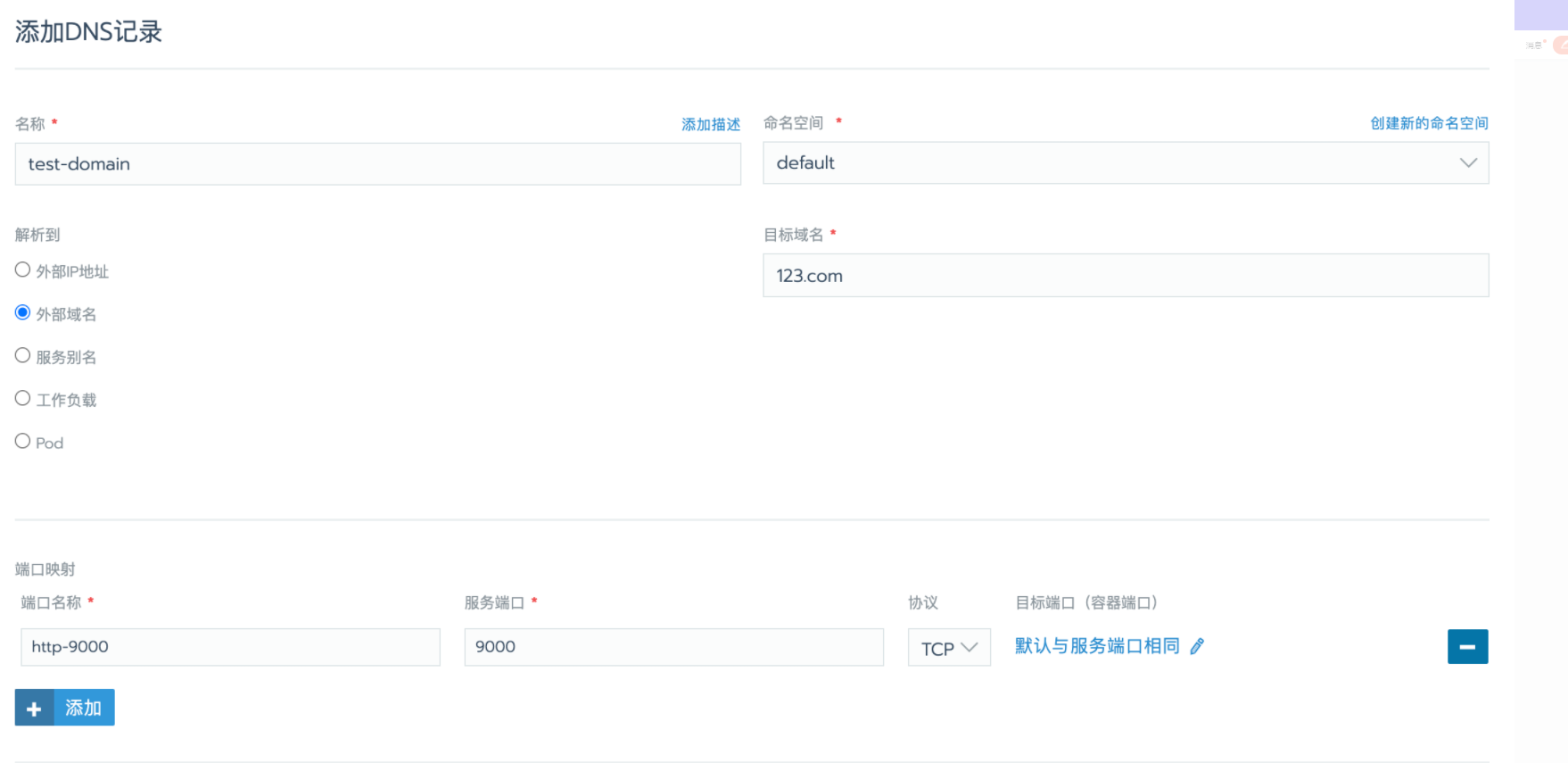
Ingress 规则创建
- 在负载均衡页面添加一条新的 ingress 规则。如下图,添加 目标后端 的时候先删除默认的后端规则,然后点击服务。
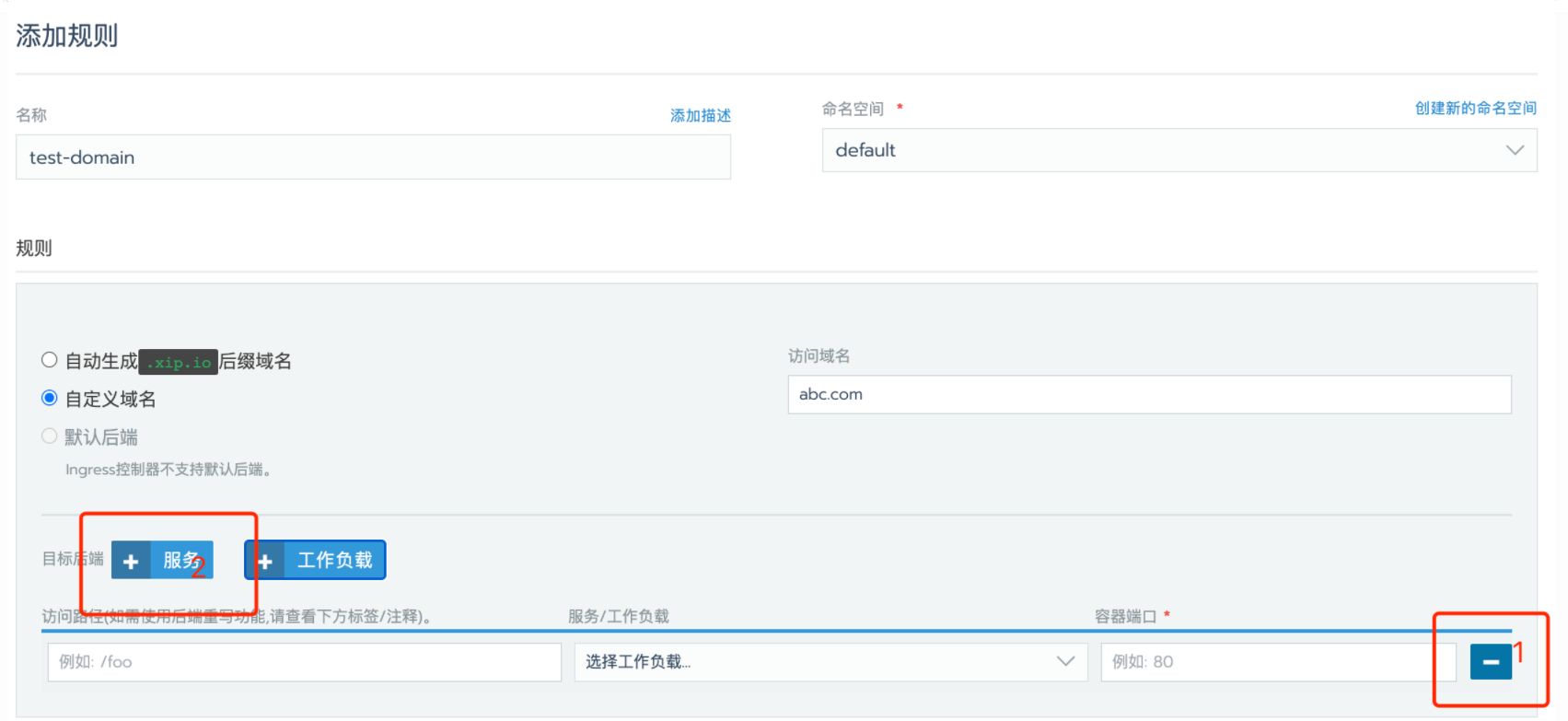
- 因为只有选择 服务 此处才能选择之前创建的 DNS 记录。
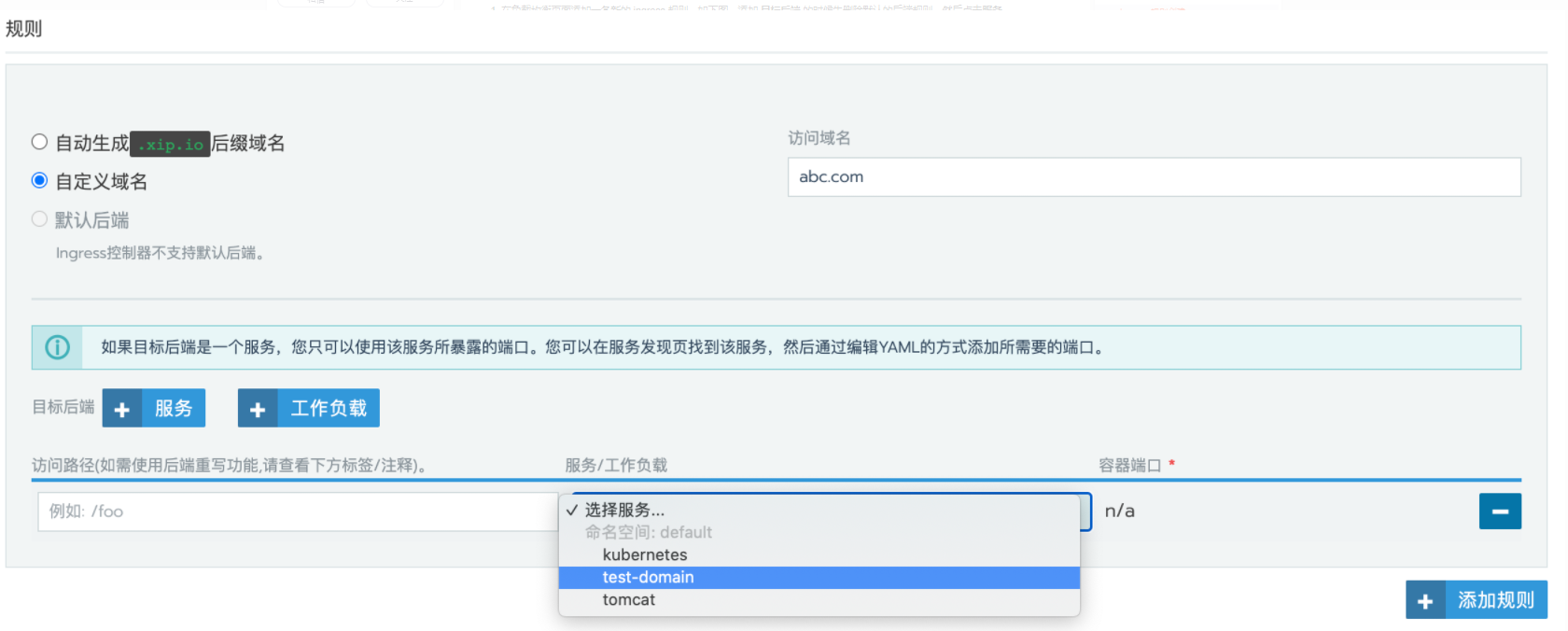
- 最后点击保存
http 域名或者 ip + 端口
编辑刚刚创建的 ingress 规则,在 标签/注释 中为 ingress 规则添加 annotations,通过 annotations 指定后端应用的访问地址。
nginx.ingress.kubernetes.io/upstream-vhost: 123.com 或者 ip+端口

https
对于外部服务为 https 访问又有两种情况,一种是权威的 ssl 证书,一种是自签名的 ssl 证书。不同类型需要添加不同的 annotations 配置。
- 权威 ssl 证书
nginx.ingress.kubernetes.io/upstream-vhost: 123.comnginx.ingress.kubernetes.io/secure-backends: "true"nginx.ingress.kubernetes.io/backend-protocol: HTTPS
- 自签名 ssl 证书
nginx.ingress.kubernetes.io/upstream-vhost: 123.comnginx.ingress.kubernetes.io/secure-backends: "true"nginx.ingress.kubernetes.io/proxy-ssl-verify: "off"nginx.ingress.kubernetes.io/backend-protocol: HTTPS
外部服务后端重写
如果外部服务是以 http(s)://123.com/path 的 url 形式访问,那么需要为其配置后端重写才能保证能通过 abc.com 这种形式访问。
后端重写
后端重写 主要有两种使用场景:
- 有多个后端应用,但是当前只有一个可用域名,那么需要通过
<单域名>/的方式来区分。 - 多个应用通过子目录的方式部署在一个 web server 下,需要通过多个域名来访问应用。
单域名 + Path
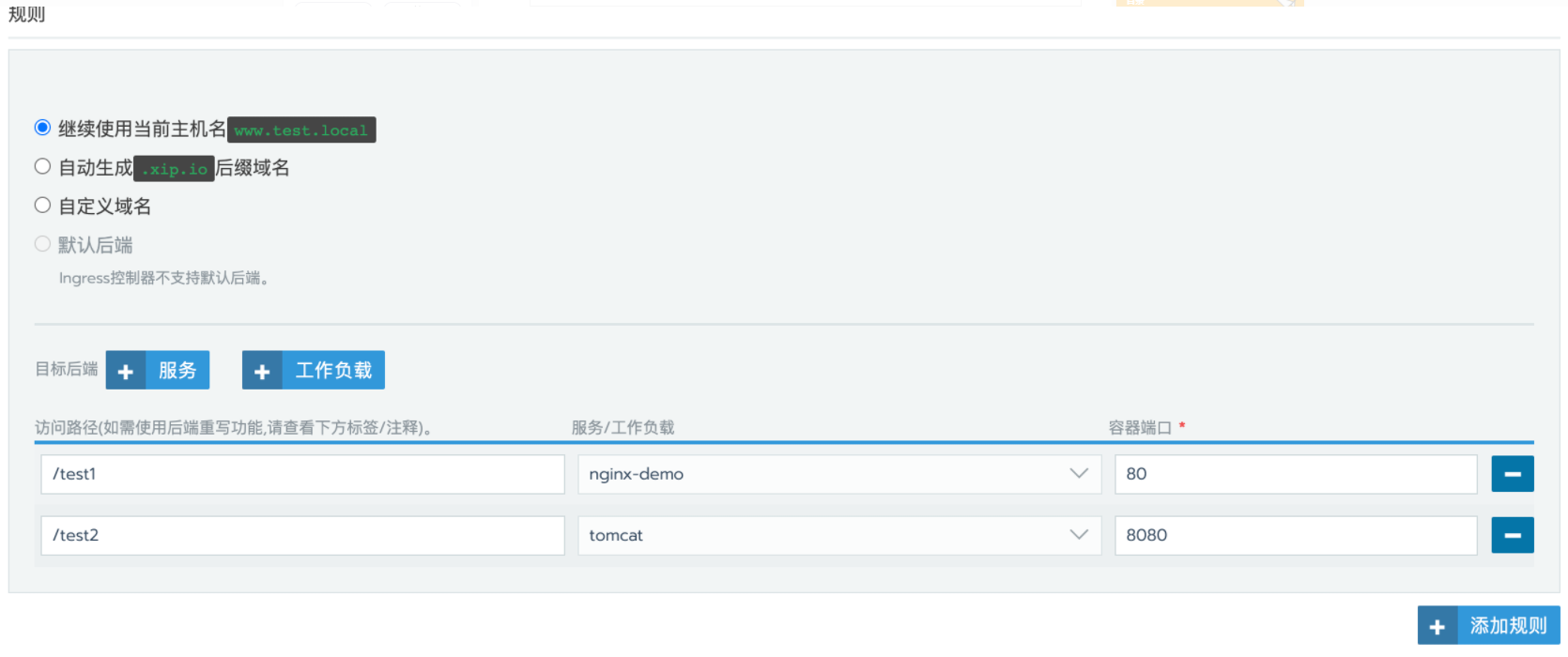
如上图,可用配置多个 Path 来区分多个服务。 但是当访问 <单域名>/ 的时候,可能会出现 404 错误。因为当访问 <单域名>/ 的时候会是去后端服务页面中找 Path 路径,可能 Path 是随意设置的,后端服务页面并不存在此页面,所以会提示 404 错误。并且我们要求访问 <单域名>/ 的时候是访问后端服务的根目录,而不是子目录,所以需要通过后端重写的方式将请求转发到根目录。
在 ingress 可通过配置以下注释达到预期要求:
nginx.ingress.kubernetes.io/rewrite-target: /

多域名 + Path
如果多个应用是以子目录的方式部署在同一个 web 服务器中,这种情况其实是可通过 <域名>/ 的方式来访问的。但是有时候可能需要不加 Path 后缀,直接通过域名访问。这种需求也需要通过 后端重写 的方式来设置,其配置方法正好与 单域名 + Path 相反。
注意: 如果请求的资源不是全部在子站点中,那么页面重写过去之后,可能存在一些静态资源无法加载的问题,因此需要根据实际的应用架构来确定是否采用这种后端重写。
-
在 ingress 规则中添加以下注释来实现页面重写:
nginx.ingress.kubernetes.io/rewrite-target: /test -
Path 处设置为
/(.*) -
完整 ingress yaml 示例:
apiVersion: extensions/v1beta1kind: Ingressmetadata: annotations: nginx.ingress.kubernetes.io/rewrite-target: /test/$1 name: test-domain namespace: defaultspec: rules: - host: www.test.local http: paths: - backend: serviceName: ingress-541fa2c5687afb7ccb3c7c9a13fa7119 servicePort: 80 path: /(.*)
隐藏 Ingress - Nginx 版本号
Ingress 是内置 NGINX 来提供负载均衡服务,默认显示 nginx 版本号。为了安全有时候会要求关闭版本号显示,可通过修改配置映射来隐藏版本号。
在配置映射中设置:
- Rancher UI 配置
server-tokens=false - YAML 配置
server-tokens: "false"
自定义 http 和 https 端口
在 Rancher 部署的 K8S 集群中,默认部署了 ingress 控制器。ingress 控制器以 DaemonSet 类型部署,并且以 host 网络模式运行。ingress 控制器默认会监听 80 和 443 两个端口来提供 web 服务,所以如果主机上原来已经有服务监听了 80 或者 443 端口,那么 ingress 控制器部署将会出现端口冲突。
根据部署方式的不同,大概有以下几种修改方式:
更新工作负载修改 http 和 https 端口
- 依次进入 目标集群|system 项目,在工作负载中找到 nginx-ingress-controller,点击右侧省略号菜单,选择编辑。

- 在配置详情页面中,点击右下角 显示高级选项,然后打开 命令 选项卡
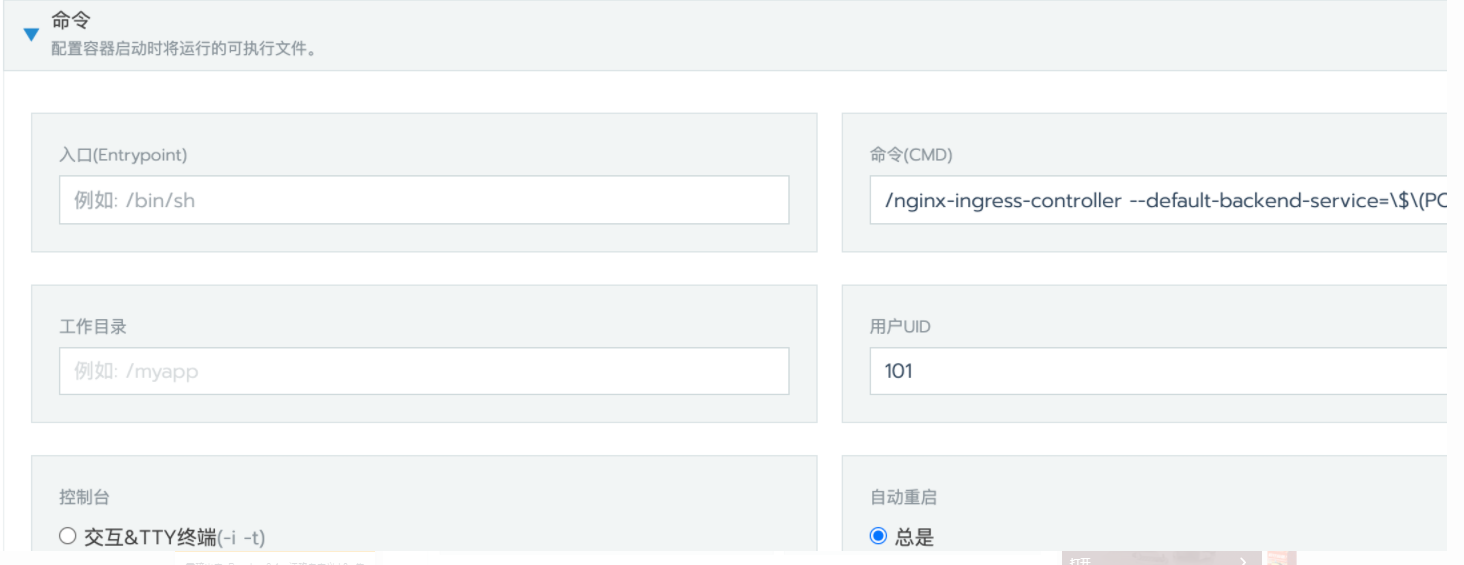
- 在命令配置栏中添加配置参数,比如:
--http-port=8880 --https-port=8443

RKE 配置文件修改
如果使用 rke 创建 K8S 集群,那么可以在 rke 配置文件中指定 ingress 的端口参数。
ingress:
provider: nginx
options:
map-hash-bucket-size: "128"
ssl-protocols: SSLv2
extra_args:
enable-ssl-passthrough: ""
http-port: 8880
https-port: 8443
Rancher 自定义集群
与 rke 集群相似,可以编辑集群的 YAML 配置文件,然后添加对应参数。

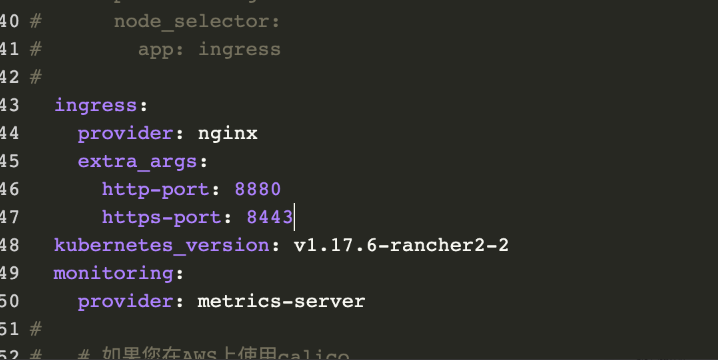
自定义 client_max_body_size 大小
编辑 ingress 规则,在注释中添加:
nginx.ingress.kubernetes.io/proxy-body-size: 32m

如果想全局配置 proxy-body-size 大小,则在配置映射文件中添加
proxy-body-size=32m
自定义 Proxy buffering 大小
-
默认情况下,ingress 配置中禁用 Proxy buffering 。所以需要配置以下设置开启:
nginx.ingress.kubernetes.io/proxy-buffering: "on"如果想全局开启 Proxy buffering ,则在配置映射文件中添加
proxy-buffering=on。 -
默认情况下,Proxy buffering 大小设置为
4k,可通过以下配置修改大小:nginx.ingress.kubernetes.io/proxy-buffer-size: "8k"如果想全局配置 Proxy buffering 大小,则在配置映射文件中设置
proxy-buffer-size=8k
开启 TLS/HTTPS
默认情况下,如果 ingress 规则对象入口启用了 TLS/HTTPS,则 ingress-controller 将使用 308 永久重定向将 HTTP 请求重定向到 HTTPS 请求。如果需修改 308 为 301
某些情况下可能希望 http 和 https 同时使用,那么就需要禁止 TLS 自动重定向。可以在 ingress 规则中添加以下注释来禁止重定向:
nginx.ingress.kubernetes.io/ssl-redirect: "false"
如果想全局禁止 TLS 自动重定向,可以在配置映射文件中配置: ssl-redirect=false 来禁止。
记录客户端地址
跨域配置
nginx.ingress.kubernetes.io/cors-allow-methods: "PUT, GET, POST, OPTIONS"
nginx.ingress.kubernetes.io/cors-allow-headers:"DNT,X-CustomHeader,Keep-Alive,User-Agent,X-Requested-With,If-Modified-Since,Cache-Control,Content-Type,Authorization"
nginx.ingress.kubernetes.io/cors-allow-origin: "*"
白名单
nginx.ingress.kubernetes.io/whitelist-source-range: 192.168.1.0/24,192.168.2.8
请求速率限制
nginx.ingress.kubernetes.io/limit-rps: '100'
websocket 配置
nginx.ingress.kubernetes.io/configuration-snippet: |
proxy_set_header Upgrade "websocket";
proxy_set_header Connection "Upgrade";
nginx.ingress.kubernetes.io/proxy-read-timeout 3600;
nginx.ingress.kubernetes.io/proxy-send-timeout 3600;
自定义 header
全局配置 header
- 复制以下内容创建自定义 header ConfigMap 文件
apiVersion: v1
data:
X-Different-Name: "true"
X-Request-Start: t=${msec}
X-Using-Nginx-Controller: "true"
x-custom-headers: xxxxx
kind: ConfigMap
metadata:
name: custom-headers
namespace: ingress-nginx
配置效果:

- 在 system 项目|配置映射 下找到 nginx-configuration 配置映射并编辑它,添加如下配置:
nable-underscores-in-headers=true
proxy-set-headers=ingress-nginx/custom-headers
配置效果:
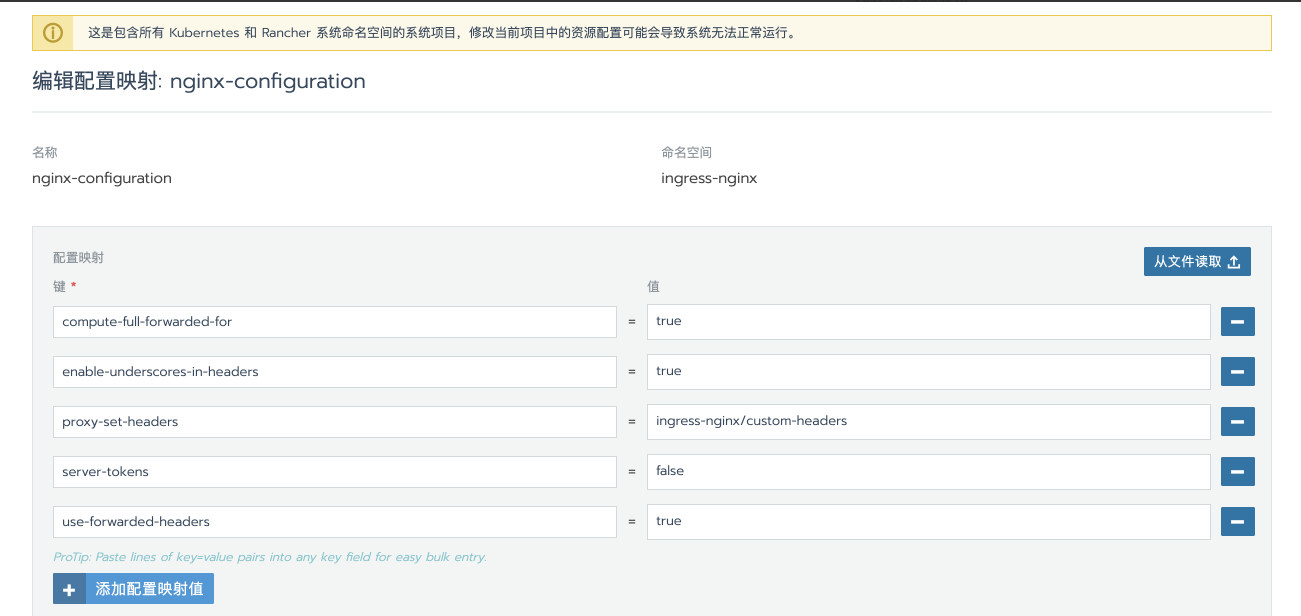
- 注意:如果配置一直没有更新,则需要重启 ingress 控制器 Pod,以触发配置更新。
单个 ingress 规则配置自定义 header
-
在 system 项目|配置映射 下找到 nginx-configuration 配置映射并编辑它,添加如下配置:
enable-underscores-in-headers=true -
编辑 ingress 规则的 YAML 配置,添加如下配置:
apiVersion: extensions/v1beta1
kind: Ingress
metadata:
annotations:
nginx.ingress.kubernetes.io/configuration-snippet: |
more_set_headers "Hello: World";
more_set_headers "Hello1: World1";
配置效果:
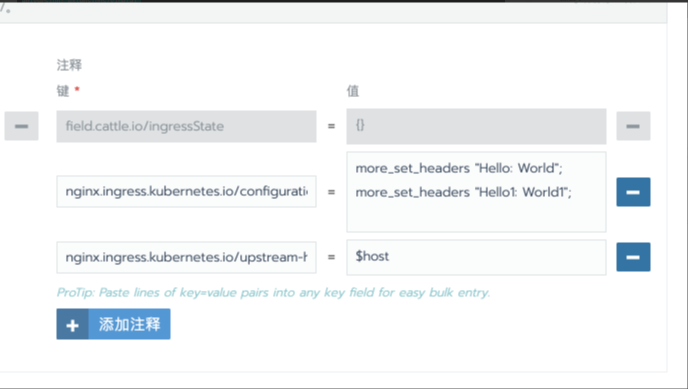
自定义日志输出格式
-
upstream log format
在配置映射文件中添加以下配置:
log-format-upstream: '{"time": "$time_iso8601", "remote_addr": "$proxy_protocol_addr", "x_forward_for": "$proxy_add_x_forwarded_for", "request_id": "$req_id", "remote_user": "$remote_user", "bytes_sent": $bytes_sent, "request_time": $request_time, "status": $status, "vhost": "$host", "request_proto": "$server_protocol", "path": "$uri", "request_query": "$args", "request_length": $request_length, "duration": $request_time,"method": "$request_method", "http_referrer": "$http_referer", "http_user_agent": "$http_user_agent" }'



【推荐】国内首个AI IDE,深度理解中文开发场景,立即下载体验Trae
【推荐】编程新体验,更懂你的AI,立即体验豆包MarsCode编程助手
【推荐】抖音旗下AI助手豆包,你的智能百科全书,全免费不限次数
【推荐】轻量又高性能的 SSH 工具 IShell:AI 加持,快人一步
· .NET Core 中如何实现缓存的预热?
· 从 HTTP 原因短语缺失研究 HTTP/2 和 HTTP/3 的设计差异
· AI与.NET技术实操系列:向量存储与相似性搜索在 .NET 中的实现
· 基于Microsoft.Extensions.AI核心库实现RAG应用
· Linux系列:如何用heaptrack跟踪.NET程序的非托管内存泄露
· TypeScript + Deepseek 打造卜卦网站:技术与玄学的结合
· 阿里巴巴 QwQ-32B真的超越了 DeepSeek R-1吗?
· 【译】Visual Studio 中新的强大生产力特性
· 【设计模式】告别冗长if-else语句:使用策略模式优化代码结构
· 10年+ .NET Coder 心语 ── 封装的思维:从隐藏、稳定开始理解其本质意义